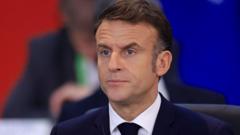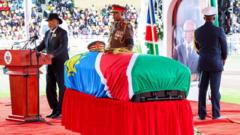President Macron announced the formation of a commission comprising French and Haitian historians to study the complex relationship between the two nations, focusing on the repercussions of the debt Haiti was forced to pay for independence. The initiative aims to promote dialogue and potential reconciliation as Haiti continues to grapple with socio-economic challenges.
Macron Establishes Commission to Explore French-Haitian Historical Relationship

Macron Establishes Commission to Explore French-Haitian Historical Relationship
A new commission is set to analyze the long-standing historical ties between France and Haiti, highlighting the impact of colonial debts on Haiti's development.
France's President Emmanuel Macron has announced the establishment of a commission dedicated to examining the intricate historical ties between France and Haiti. This initiative comes as a response to the lingering ramifications of a significant debt imposed on Haiti, which was primarily intended as compensation to French slave owners following the nation's independence in 1804. Initially set at 150 million gold francs, the debt was ultimately reduced to 90 million but was not fully repaid until 1947, significantly hindering Haiti's development and contributing to its standing as one of the poorest nations in the Americas.
Macron emphasized the importance of this panel of historians from both nations, suggesting that their findings could lead to recommendations aimed at fostering a more "peaceful future." He acknowledged that the debt placed a considerable burden on a newly independent nation, an early reflection of historical injustices that have persisted over time. While discussions of reparations have historically been sensitive, Macron's government has demonstrated some willingness to confront the contentious legacy of colonialism and slavery, although it has stopped short of committing to financial reparations.
In an interview with Le Monde, Haitian author Monique Clesca highlighted the wider implications of France's historical wrongs on its global standing, particularly in Africa, where former colonies are increasingly distancing themselves. She pointed out that acknowledging the injustices of the independence debt might not resolve all grievances but could serve as a step towards easing the emotional scars left by colonial exploitation.
Haiti is currently facing a tumultuous period marked by economic instability, a lack of effective political governance, and pervasive gang-related violence. In 2024 alone, more than 5,500 lives were lost to gang warfare, and over a million people have been displaced. Efforts to hold elections have been stalled by a transitional presidential council tasked with restoring democratic order, further complicating the nation's future prospects amidst these challenges.





















